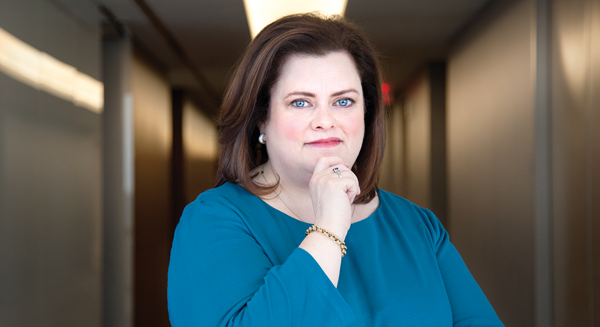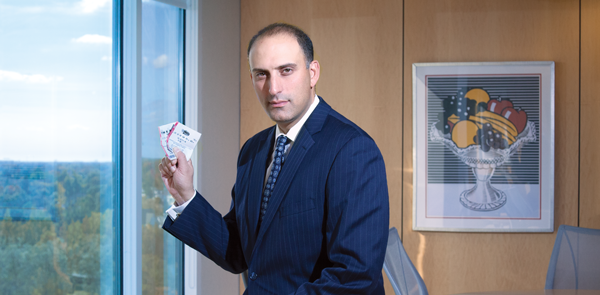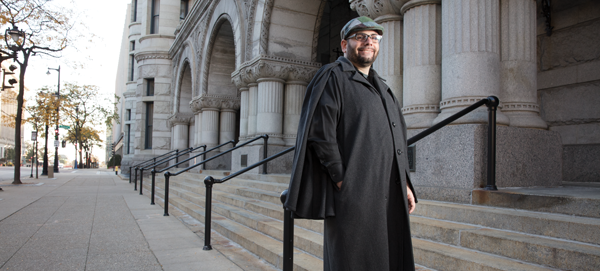Some windfall winners need a lawyer to protect them from themselves

Shutterstock
You could say Laura Kelly is in the big-money end of the legal profession. But for Kelly, a partner practicing wealth preservation and estate planning at McCarter & English in Newark, New Jersey, much of that money belongs to her often newly wealthy clients.
Kelly advises lottery winners, people who’ve inherited money and those who have built their own fortune. “I represent a client who was successful in his own right, and we did a regular estate plan,” she explains. “Then he called one day and said, ‘My relative left me $50 million.’ All of a sudden, it shifts your planning.”
Other clients include a Long Island couple who are about to strike it rich through their own labor. “He’s been working at a company he and a group of friends created,” Kelly says. “After about 10 years, they’ve picked up their heads and realized all their hard work has been paying off. They’ll have a liquidation event in the next year that will result in $100 million to their family.”
Also among Kelly’s clients are a couple who were part of a classic workplace lottery pool that won about $58 million after taxes. “They were blue-collar, normal, down-to-earth, lovely people who didn’t think this would happen to them,” she says. “Their share was about $12 million.”
As the couple worked through the process of claiming and protecting their winnings, they consulted Kelly about whether they could truly afford certain things. “They were asking if they could afford to pave their driveway,” she recalls. “And they treated themselves to a boat.
“Fortunately, the people I’ve worked with aren’t the ones who go Kardashian on me. They’ve been smart enough to take a beat and see how the money would impact their lives.
“It’s like they’ve said: ‘I’ve got millions of dollars in my account, but what does this really mean? How wealthy am I? Am I this rich?’ That was very endearing.”

Laura Kelly: “Fortunately, the people I’ve worked with aren’t the ones who go Kardashian on me.” Photo by Len Irish
RICHES TO RAGS
What’s common—regardless of the source of the funds—is that the sudden wealth might take some getting used to. Research on outcomes for windfall recipients is sparse. But a 2009 Vanderbilt Law School study found that winning the lottery didn’t do much to prevent people who were struggling financially from eventually filing for bankruptcy. Some winners used their new riches to take more risks or buy material things; others simply didn’t know how to manage large sums of money.
Lawyers who’ve built an expertise in advising these fortunate few agree that they face serious challenges to preserving their new wealth. The taxman always demands a cut. So-called friends and family members pile up requests for loans, gifts or investments in their no-way-you-can-lose idea that’s truly a dud. Or recipients simply break their own bank with reckless decisions.
“We always walk through with clients my parade of horribles, and it’s not only in one sitting that we do this,” explains Marc H. Lamber, a partner at Fennemore Craig in Phoenix who represents clients in personal injury claims that often result in large recoveries. “I tell them all the things I’ve seen over the years. I also direct them to speak with tax advisers. But it follows the cliche that ‘you can lead a horse to water, but you can’t make it drink.’ “
The goal for these lawyers is to provide solid direction for clients whose lives will never be the same. “Money can be life-changing in good and bad ways,” says Eido M. Walny, founder of the Walny Legal Group in Milwaukee. “The goal of planning is to maximize the opportunities for good things to happen and to limit the opportunities for bad things to happen. But that can be a challenge easier said than done.”
The sources of newfound largesse probably are broader than most people realize. Jason M. Kurland bills himself as the “lottery lawyer” because those winners make up the vast majority of his practice.
The money that Kurland’s clients have won is staggering. He represented the winner of a $336 million jackpot, another $254 million winner and many, many takers in the $1 million to $10 million range. “Right now, I represent three who are getting their checks in the next week, and those will be $5 million to $6 million,” says the East Meadow, New York-based partner with Certilman Balin Adler & Hyman.
The sums are so mind-boggling that Kurland’s partners have become hard to faze. When he mentions that a client has won several million dollars, their response to him often is: “That’s it?”
It’s a different story for Steven M. Cohen, a partner and the litigation chair at HoganWillig in Buffalo, New York. The most common source of a windfall for his clients is a medical-malpractice or personal injury claim, although he and other lawyers who counsel clients with newfound wealth often blanch at the term windfall.
“It implies it’s not justified,” he says. “I prefer to label it as ‘clients suddenly with a large sum of money.’ “
With Kelly’s guidance, her careful couple continue to do well, as have the vast majority of clients these lawyers advise. Kelly suspects that might be because half the battle for clients with sudden wealth is recognizing they have to have expert advice to manage it well.

Jason Kurland: “If clients win $10 million, they’re not getting $10 million; Depending on what state they’re in, they’ll get a fraction of that.” Photo by Len Irish
TAXES, SCHMAXES
It might seem like tax planning is a huge part of advising clients with new money, but it might be the easiest part.
“Taxes are what they are,” Kurland says. “Up front, I try to explain what the taxes are. On the lottery, the lottery officials withhold a lot of money. If clients win $10 million, they’re not getting $10 million; depending on what state they’re in, they’ll get a fraction of that.”
Walny, like Kurland, is philosophical about the tax implications. “The nice thing is people are generally comfortable with taxes,” he says. “So that’s not a difficult conversation to have with them.”
What’s harder to get clients to grasp is that their family might not act honorably. That doesn’t always sink in with clients who love their relatives and might genuinely want to share their wealth to raise everybody’s standard of living.
In the early 1990s, Cohen represented a woman who recovered $1.45 million in a lawsuit. She’d always lived paycheck to paycheck and taken care of her extended family, despite the fact that they weren’t very kind to her.
“Suddenly, people who had treated her very poorly started treating her nicely,” he says. “She was so thrilled to be treated nicely that all of the sudden, everybody’s lifestyle improved. One year and two months later, all her money was gone.”
Then there was a young man who became addicted to narcotic painkillers after an accident, and his parents often bailed him out of the scrapes he’d gotten into to feed his addiction. Cohen helped him recover $6.6 million in a lawsuit regarding his injuries.
“As soon as he got his recovery, his parents started to lay into him with guilt,” Cohen recalls. “The son bought them a new house and new vehicles—even a car that was too big for his mother to drive. Two years later, all the money was gone. I’ve seen powerful guilt tactics applied to clients that would make a statue cry.”
Supposed friends also surface to see what they can wrest from clients. “People you never knew were your friends will start to become your friends,” Walny says. “The person you haven’t talked to since third grade will rekindle that relationship from 30 years ago.
“Outside parties are thinking, ‘You have so much more than me; what difference does it make to you if you give me $10,000?’ If you start giving the money away that way, before you know it, a lot of money starts flowing out the door. It’s difficult to be disciplined enough to say, ‘I can’t. I won’t do this.’ “
Then you have to watch for those who just want an investor in their surefire business venture. Walny notes that it sounds less off-putting to say, “Would you invest in this business project?” than “Would you loan me money?” Yet the results are the same—clients giving money they’ll never see again.
As if all that weren’t enough, clients also must beware unscrupulous advisers.
“It’s not just friends, family members and charities that come out of the woodwork, but it’s also financial advisers,” laments Sharon L. Klein, president of the Wilmington Trust’s New York metro region in New York City. “Some get compensated on how frequently they sell products, and that’s another way clients could be preyed upon.”

Eido Walny: “Asset protection, whether it’s against known or unknown creditors, is critical.” Photo by Wayne Slezak
SILENCE IS GOLDEN
Lawyers also strongly advise clients to avoid such situations altogether by staying mum and even disappearing. Whenever possible, Cohen bakes that into his representation by including confidentiality clauses in settlements.
Secrecy often is easier to maintain for clients who get an inheritance or legal recovery. Those who win the lottery aren’t always able to do that if their state requires that winners parade before the media.
Even for those clients, Klein suggests strategies to avoid the limelight. They typically have a year to collect their proceeds, so Klein suggests they take that time to figure out their future. Where do they want to be, and what do they want to do with their lives? Ideally, if clients are likely to relocate, Klein advises them to do that quietly, ending up in a community that will reflect the wealth they now have, so they raise fewer eyebrows as their lifestyle changes.
For those who aren’t able to stay quiet, lawyers recommend leaning on advisers as a secondary line of defense.
“The biggest thing is to surround yourself with qualified advisers,” Walny suggests. “That way, the client can honestly say, ‘I don’t handle direct management of this money. You need to talk to my financial adviser or manager or lawyer.’ We don’t have a relationship with the people asking for money, so we take out the emotional side of the transaction.”
This also is where lawyers’ expertise at setting up complicated financial structures provides additional safeguards.
“Asset protection, whether it’s against known or unknown creditors, is critical,” Walny says. “This wealth affects people in different ways. Sometimes their worst enemy is themselves. Sometimes it’s friends. Sometimes it’s the smart aleck at the bar who wants to pick a fight with you, so he can sue you.”
Walny says he sets up legal instruments to be complicated for two reasons. One is to allow clients plausible deniability when they deflect a request for money. Another is to build a defensive wall against creditors.
“Asset protection isn’t about putting impenetrable bubbles around assets,” Walny says. “It’s about building walls—and many of them—so that if creditors come along, even if they can scale one or two walls, they’ll settle.”

Sharon Klein: “Parents don’t want this to affect the productivity and contribution to society their children will make.” Photo by Len Irish
VALUES VS. LIFESTYLE
Sometimes the worries of wealth spring from inside the household. Klein says this is a big concern for many of her clients. “One of the major themes I always hear in the sudden-wealth scenario is that parents don’t want this to affect the productivity and contribution to society their children will make,” she says.
Nancy Smith, who is not one of Klein’s clients, inherited a multimillion-dollar fortune from relatives (the ABA Journal is using a pseudonym to protect her family’s privacy). She and her husband worry that making the wrong moves could change her son’s character. “I worry about him,” she admits. “He’s a really good kid.”
The couple spend money to give their son experiences instead of things. They give him an allowance, which he has to budget, and they’ve told him he’ll have to buy his first car. They never reveal to him how much money they have and aren’t above fibbing to keep their son grounded. His mother says she occasionally utters “We can’t afford it” in response to a request for something that doesn’t fit their plan.
“He’s growing up, and his character is building,” she says. “We’re very cognizant of the fact that we could spoil him and turn him into a brat and create somebody who doesn’t have a work ethic. We guard against that assiduously.”
Her son is no dummy, and he’s asked about their lifestyle, on occasion prompted by his friends’ comments. “My response is that we’re not rich,” she says. “We’re comfortable, and there will always be people richer, poorer, smarter, less smart, more popular or less popular. It’s just how the world works. We’re somewhere in the mix. He doesn’t need to know.”
They’ve set up a trust for their son’s education, in addition to another for his expenses once he’s older. He’ll get a distribution when he turns 25, another when he’s 30 and then another at 35. “He’s not going to be a rich 25-year-old kid who can buy the Ferrari and take his friends to Ibiza,” Smith says.
Charitable trusts or foundations that force family members to communicate with and listen to one another often are effective tools. Klein creates entities that require children to give away a portion of the assets each year to beneficiaries that all children agree to benefit.
“If you have a common value and they can hear and respect others’ opinions, that goes a long way toward keeping them together as a family,” Klein asserts.

Photo illustration by Brenan Sharp
PICKING UP THE SLACK
More often than they like, lawyers who advise the suddenly affluent must use their expertise to undo the mistakes of other lawyers who took on work beyond their ability.
“Many times I’m hired by that lawyer,” Kurland says. “The lawyer will say, ‘I have this client, and I’m not sure what to do.’ They’re just like I would be if a matter was outside my experience.”
But Kurland and Walny both have seen other lawyers fail to take that necessary step.
“It’s a big problem among lawyers,” Walny says. “Lawyers all think they can do anything. They think: ‘How hard could this be?’ Or maybe the lawyer is that third-grade buddy of the person who just won the lottery; the lawyer offers to help and makes a mess. And if you’re dealing with someone who’s unscrupulous, you can be robbed by your own lawyer or banker.”
Mistakes can trigger tax and legal liability and jeopardize clients’ fortunes. Walny had one client who suddenly landed several million dollars and sought assistance from an inexpensive lawyer. The client was about to marry and was concerned about protecting his money from creditors, including his future wife in the unfortunate event of divorce.
“The attorney took documents for a revocable trust and simply reworked them to create an irrevocable trust,” Walny recalls. “You can’t just take a Volkswagen and put fancy tires on it and race it in the Indy 500. This lawyer charged a very small amount but caused umpteen tax problems and handcuffed the client in terms of the assets he owned. And the trust would have had no effect on a potential divorce. The lawyer created an absolute mess.”
Kurland lets clients choose how to pay for his services, although contingency fees are out of the question.
“That would be way too much,” he says. “We can do hourly. Or sometimes they like to know it’s a capped number, but [with] that they can have my ear and call me whenever they want. If it’s as simple as setting up a trust and helping them claim the money and never seeing them again, that’ll be one fee. Or maybe they’ll want me involved in every decision they make—they don’t know how to spot the scams—and on every single call, whether it’s with relatives or financial planners. Depending on what they want me to do, the fees will be different.”
However, clients who are unaccustomed to shelling out big sums for professional advice can be hesitant. Walny’s potential client whose first lawyer created the irrevocable trust couldn’t fathom the cost that Walny estimated to fix the jam the client was in.
“The client came to me and said, ‘I get the sense this might have been a little light; can you fix it?’ ” he recalls. “I told him the problem was serious, and that it was going to be difficult to undo. It was possible, but it would be pricey. We estimated the work at $10,000 to $20,000.
“The client said, ‘The other guy charged me $500. How can you charge me so much to fix it?’ He ultimately bugged out. He couldn’t comprehend that price. He was in denial about the whole problem.”
That’s happened to Walny more than he likes, and it nags at him. “For me, the bad ones are the ones we can’t help,” he explains. “Whether they’re not mentally prepared, not wanting to pay for it or not ready to receive the help—for whatever reason, you couldn’t close the deal.
“I worry about them the most. They’re the most exposed to taxes, to creditors and to all the elements that make this a difficult situation. I often wonder, ‘Whatever happened to that guy?’ “
THEIR OWN WORST ENEMY
Lawyers can’t always protect clients from themselves. Sure, they can set up trusts, require that substantial withdrawals from accounts have counter-signatures, and create annuities that disburse funds over time instead of all at once. But lawyers can’t change who people are, and that’s sometimes clients’ biggest downfall.
Kelly’s theory is that money is an amplifier. “If you have a stable relationship, it stays stable,” she says. “If there are cracks, it amplifies them, just as frost would do damage if it got into your front stoop.”
Cohen calls stable clients “rational budgeters.” They analyze their new status and make reasonable upward adjustments. They essentially live happily ever after. Other clients have what Cohen describes as “pent-up deprivation.” It’s often devastating because these clients either blow through their money by buying things, or they do it by failing to consider the long-term costs—such as taxes, insurance or maintenance—for that already-pricey second or third house or car.
“These people have been deprived their entire lives, or perhaps even struggling, and as soon as they get their windfall, they go on a spending binge,” Cohen says. “They also seek to share their wealth to show off a little or thank those who’ve helped them. They have a lifestyle explosion. There are very few people on this planet who can sustain a lifestyle explosion on a day-to-day basis.”
Among those with pent-up deprivation are the dreamers. This type of client will always have wanted to do something, whether it’s own a country store or build a magnificent structure (both are real-life examples among Cohen’s clients).
“They start a construction project, but it’s a little foolhardy,” Cohen says. “If they’re pigheaded, they don’t take advice. We’ve had people $16 million into a project who didn’t have enough money to finish it.”
Fennemore Craig partner Lamber has seen clients be similarly impulsive and make mistakes that can’t be undone. The most damaging is destroying an annuity created to preserve the funds for the long term, which can trigger stiff penalties and huge losses.
“I’ve seen—in rare instances, but I have seen it happen—where the money has been prematurely dissipated,” he says.
“That’s disappointing. You’re dealing with a client who tried to do things right, understood the risks and tried to avoid them, and ultimately couldn’t.”
Some clients even go into deep depression after becoming wealthy. They’ve been unhappy but blamed it on living hand to mouth. When they no longer have to live that way, they’re stunned to find that they’re not happier.
“That happens from time to time,” Cohen says. “We refer them to counselors.”
PROFITABLE TALES
Luckily, these lawyers have—and love to share—the much more common happy endings for their clients. With Walny, it’s the client who blew Walny’s socks off one day.
Walny had set up a relatively complicated plan that involved a series of trusts and business entities to protect the client’s assets and minimize the tax burden. Walny and the client, who was more sophisticated than most people were but wasn’t a financial or legal expert, headed to a bank to set up the accounts. But the banker couldn’t grasp Walny’s plan.
“I’m generally good at talking to people about what we’ve set up, but maybe I didn’t have enough coffee that morning,” Walny recalls. “The banker wasn’t understanding what I was saying. The client said, ‘Let me take a stab at it.’ The client did a fantastic job of explaining each trust, why we did it, and the roles each person was going to play. It showed that along the way, we’d done a good job of explaining to him and his family in a way they could synthesize. He’s one of the clients I’m proudest of.”
Successes for clients whose suffering has led to their newfound wealth can be even more profound. One of Lamber’s clients was a child who sustained serious injuries and whose educational and physical needs couldn’t be met in a public school. The legal recovery allowed the parents to enroll the child in a private school with vast resources. “This child recently graduated,” Lamber says. “It’s a remarkable story.”
Another family used their recovery to pursue a change in the law that governs the loading and unloading of passengers on buses.
“This is where you’re really touching people because it’s going far beyond one family,” Lamber says. “They succeeded relative to a particular type of accident, where a loophole was closed. It’s their belief and mine that this change will save lives. They lost someone, and there’s no way that can ever be good. But they’ll always know they changed that law.”
G.M. Filisko is a lawyer and freelance writer based in Chicago.
This article originally appeared in the December 2016 issue of the ABA Journal with this headline: "In the Money: The heaviest lift for lawyers who advise windfall recipients might be to protect them from themselves."



